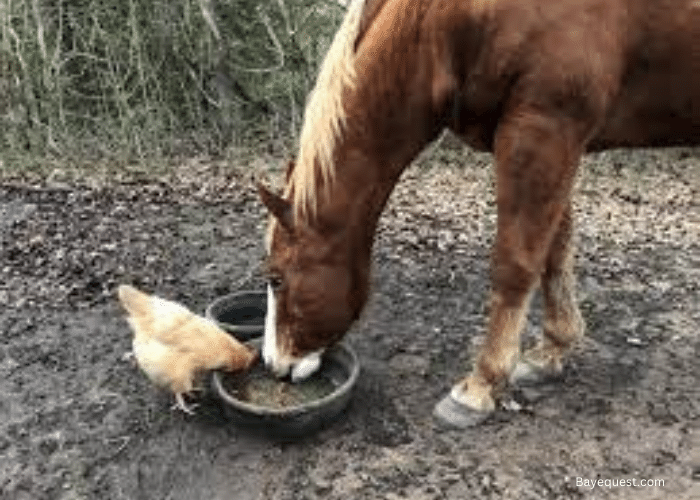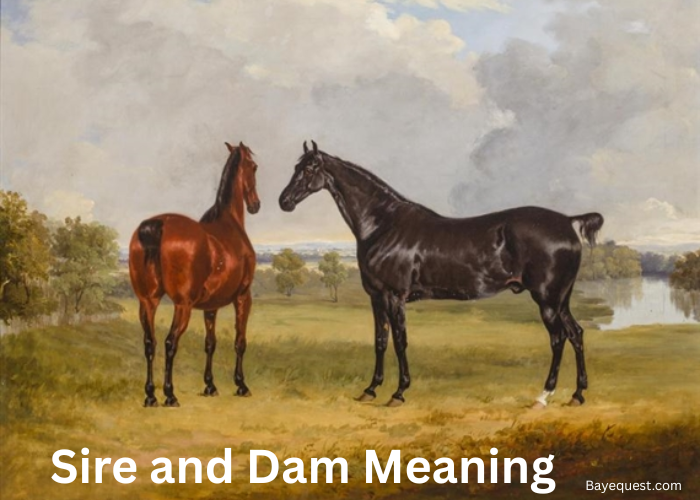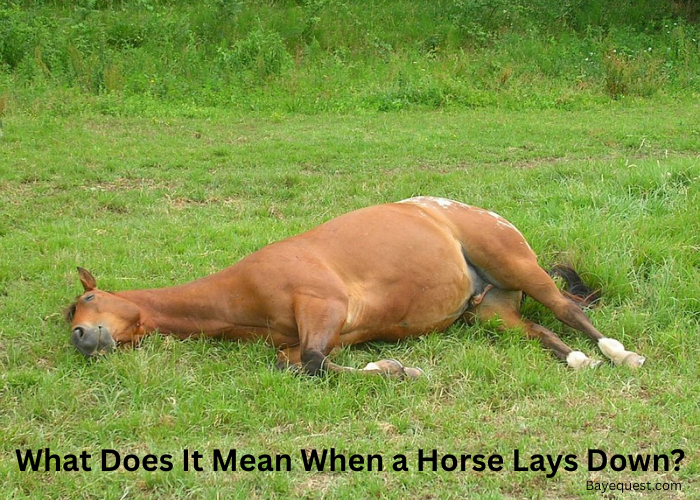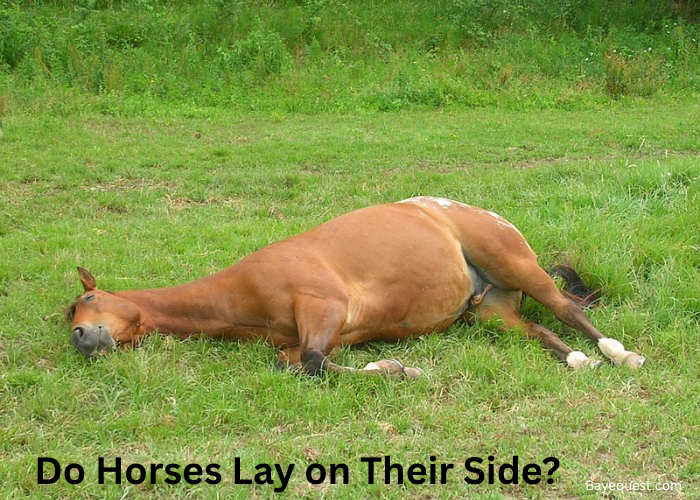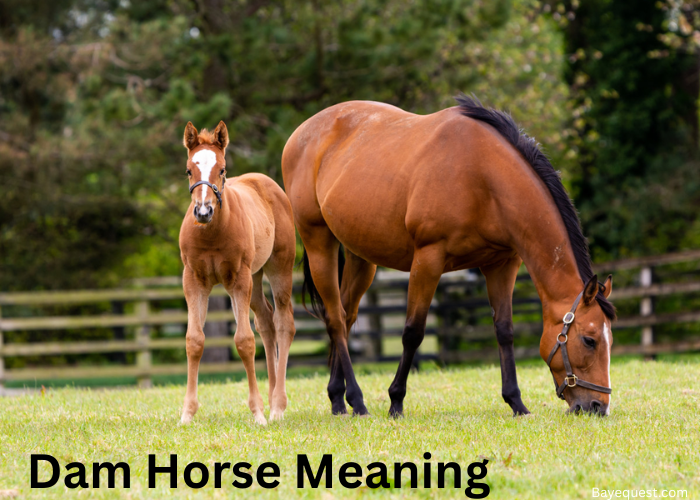Horses munch on grass and hay, right? That’s what we all know. But what if there’s more to their menu than meets the eye?
Could a horse enjoy a juicy burger or a slice of fish? It sounds strange, maybe even shocking. But every now and then, you hear a story of a horse nibbling on something unexpected.
So, do horses eat meat? Is it a myth, or is there a hidden truth trotting around?
Let’s dive into the curious eating habits of these majestic creatures.
Do Horses Eat Meat? Key Takeaway
No, horses do not eat meat. They are herbivores, which means they eat plants. Their whole body, especially their digestive system, is set up to handle a grass, hay, and grains diet. But there are some rare stories out there about horses eating meat under unusual circumstances.
Can Horses Eat Meat?
Horses love grass, hay, and grains—foods that fit their herbivorous lifestyle. But can they eat meat?
Technically, they can, but it’s far from their natural choice. Horses have a digestive system designed for fibrous plant material, not for breaking down meat.
Eating meat can cause them discomfort or digestive issues.
However, some rare stories tell of horses nibbling on meat out of curiosity or even hunger in extreme situations. While it’s not toxic, meat is not suitable for them. Horses thrive best sticking to their leafy greens.
Are Horses Omnivores?
No, horses are not omnivores. They are herbivores, which means they eat plants. Their bodies are built to digest grass, hay, and other plant materials.
While there might be rare stories of horses eating meat, these are exceptions, not the rule. Horses thrive on a fiber-rich diet, and their long digestive tracts are specially designed to break down.
So, sticking to what’s natural for them is traditional and essential for their health.
Do Horses Need Meat?
No, horses don’t need meat. Their bodies are designed to get all the nutrients they need from plants.
They have a digestive system that’s perfect for breaking down grass, hay, and grains. Feeding meat to a horse isn’t just unnecessary. It can actually be harmful, disrupting their digestion and causing health issues.
So, stick to a plant-based diet, which keeps them healthy and happy.
Read also: What Horses Shouldn’t Eat.
7 Reasons Why Horses Eat Meat
Horses eat meat for various reasons. These include:
Cold and harsh climate
Traditional food sources for horses, haylage and hay, can be hard to come by in extremely cold and harsh environments. Under these conditions, caretakers may feed their horses whatever is available. This might include meat or fish.
However, this isn’t ideal or part of a horse’s natural diet. Still, in survival situations, it’s about providing calories in any form to keep the animals alive and maintain their energy levels.
Adding meat in these cases is a practical response to a challenging environment where plant-based food is scarce.
As a supplement
In some instances, horse owners might believe that adding meat to a horse’s diet could enhance their health. While mainstream veterinary science does not support feeding meat to horses, some owners use animal-based products like fish oil as dietary supplements.
These are thought to provide benefits such as improved coat quality and joint health. However, you must remember that the horse’s digestive system is not designed to process meat, and regular consumption can lead to health issues.
War
In wartime, the usual rules for feeding horses can be difficult to follow. Horses used in military campaigns often had to survive on whatever was available.
This practice was born out of necessity rather than preference. In such times, maintaining a horse’s stamina and health was crucial for mobility and logistics in war.
The use of meat as feed during these times reflects the harsh realities of sustaining cavalry units far from conventional supply lines.
As an accident
Sometimes, horses consume meat accidentally. This can occur if meat waste is mistakenly mixed into their feed or if a horse, driven by curiosity, nibbles on discarded meat.
While these incidents are rare, they highlight the importance of maintaining a controlled and clean feeding environment for horses. This is aimed at preventing the unintended consumption of inappropriate or harmful substances.
Because it’s salty
Like many animals, horses have a natural appetite for salt, an essential mineral for their health. If meat, especially if it’s cured or salted, is left within their reach, they might be tempted to lick or chew it simply to satisfy their salt craving.
This behavior isn’t about a preference for meat but rather an attraction to the salt it contains. Providing adequate mineral supplements in their diet can help prevent horses from seeking out unconventional and unsafe salt sources like salted meats.
Curiosity
Horses are curious by nature and often explore their surroundings with their mouths. This exploratory behavior can sometimes lead them to taste non-traditional items, including meat.
Curiosity-driven consumption does not indicate a dietary need or preference. It’s simply a part of how horses interact with their environment, using their sense of taste to distinguish between different objects and substances they encounter.
Boredom
Boredom can lead horses to engage in abnormal eating behaviors, known as pica. This is where they chew on nearly anything they can find, including pieces of meat if they are accessible.
Providing sufficient mental and physical stimulation is crucial for horses. Engaging toys, regular exercise, and social interaction with other horses can help prevent boredom.
This will discourage the development of habits like eating inappropriate materials, including meat.
Read also: How to prevent boredom in horses.
What Meat Do Horses Eat?
Horses may eat some of the following types of meat:
Small animals
It might be hard to imagine, but horses might sometimes eat small animals if they come across them. This usually happens not because they’re hunting but because they’re curious or accidentally ingest them while grazing.
Small animals like birds or rodents can end up in a horse’s feed or water by chance, and the horse might eat them without meaning. It’s not a normal part of their diet at all.
Fish
Fish isn’t a typical food for horses, but there are rare instances where horses have been fed fish. This is especially in regions where other food sources are scarce. It can also happen in places where fish is a common part of human diets and scraps might be more readily available.
Feeding fish to horses is more about using available resources rather than meeting a dietary preference of the horse.
Human food
Horses often eat human food accidentally or when their owners offer them treats. While some human foods can be safe in small quantities, meat should not be a regular treat.
A horse might eat meat scraps from a barbecue or dinner out of curiosity or because it enjoys the taste, especially if the food is seasoned or salty.
However, just because they might eat it doesn’t mean it’s good for them. Sticking to safer treats like fruits or specially made horse treats is best.
Health Implications Of Horses Eating Meat
Feeding meat to horses isn’t just unusual, it can actually be harmful. Here’s why.
Horses are herbivores. Their digestive system is designed to break down fibrous plant material, not protein-rich meat.
When a horse eats meat, it can mess up their digestion. This can lead to all sorts of health problems like stomach pain, indigestion, and even more serious conditions like colic. These issues aren’t just uncomfortable for the horse; they can be life-threatening.
Moreover, horses’ long digestive tracts aren’t equipped to handle bacteria that are often found in meat. This can increase the risk of food poisoning, which can be serious for them.
Plus, meat doesn’t provide any nutritional benefits that horses can’t get from their regular plant-based diet. So, there’s no good reason to give meat to a horse.
In short, sticking to a diet that’s natural for them—rich in grasses, hay, and grains—is the best way to keep a horse healthy. It’s better to avoid experimenting with meat as it could lead to unnecessary and potentially severe health issues.
Anatomy Of A Horse’s Digestive System
A horse’s digestive system is uniquely adapted to processing plant material. Here’s how their system is structured and functions, emphasizing its specialization for a herbivorous diet:
Mouth and teeth. Horses have a set of strong, flat teeth designed for grinding grass and other fibrous materials. Their incisors cut the grass, and their large molars crush and grind it before swallowing. Saliva, which contains enzymes like amylase, starts digestion by moistening the food and initiating the breakdown of carbohydrates.
Also, find out whether horse teeth stop growing in adulthood.
Esophagus. The esophagus is the tube that connects the mouth to the stomach. In horses, it only allows food to move in one direction, which means that horses cannot vomit.
Stomach. Horses have a relatively small stomach for their size, making up about 10% of the digestive system. It functions best when small amounts of feed are consumed throughout the day. The stomach secretes acids and enzymes that begin the protein digestion process, but its small size limits the amount of feed it can process at one time.
Small intestine. The small intestine is where most of the digestion and absorption of nutrients occurs. Enzymes from the pancreas and bile from the liver aid in breaking down proteins, fats, and carbohydrates. Nutrients are absorbed through the walls of the small intestine into the bloodstream. This part of the digestive tract is critical for the horse’s ability to extract energy from its food.
Cecum and large colon. The cecum is a large fermentation vat where microbial digestion of fibrous plant material occurs. Bacteria in the cecum break cellulose into volatile fatty acids, which horses then use as energy sources. The large colon continues this process of fermentation and absorbs water and nutrients. This section of the digestive system is crucial because horses’ ability to digest fiber and other tough plant materials depends on its health and efficiency of their microbial population.
Small colon and rectum. The remaining nutrients are absorbed in the small colon, and the waste material begins to solidify as it loses more water. The rectum then holds the waste material until it is expelled as manure.
Nutritional Needs Of Horses
Feeding horses is about providing a balanced diet that meets their nutritional needs. Keeping the following components in check helps ensure that horses stay healthy and energetic.
Forage
Forage is the foundation of a horse’s diet. This includes grass, hay, and haylage.
It’s packed with fiber, which is crucial for a horse’s digestive system to function properly. Horses are designed to graze, eating small amounts of forage throughout the day.
This keeps their digestive system moving and helps prevent issues like ulcers and colic.
Concentrates
Concentrates, like grains and commercial feeds, are used to supplement a horse’s diet. This is mostly needed in working horses or pregnant mares.
These feeds provide extra calories and nutrients that forage alone might not supply enough of, such as protein, fat, and energy.
However, you need to balance them carefully with forage to avoid digestive problems.
Water
Water is absolutely vital. Horses need a constant supply to stay healthy. They can drink anywhere from 5 to 10 gallons a day, even more when it’s hot or they’re exercising a lot.
Water aids digestion, helps regulate body temperature, and is essential for almost every function in their body.
Read also: How long can horses survive without water?
Minerals and vitamins
Minerals and vitamins are key to a horse’s health. They need a range of minerals like calcium and phosphorus for strong bones and teeth, and salt for fluid balance and nerve function.
Vitamins are crucial for metabolic processes. For instance, Vitamin A is important for vision and immune function, and B vitamins are vital for energy metabolism.
Often, a well-balanced diet provides these, but supplements might be needed based on the horse’s health, the quality of their forage, and their activity level.
Interesting read: Can Horses Eat Tomatoes?
Does Horse Eat Meat? FAQS
Is meat toxic for horses?
Meat is not inherently toxic to horses, but their digestive systems are not designed to process it efficiently. Consuming meat can lead to digestive issues such as indigestion and colic. Prolonged or frequent consumption of meat can cause serious health problems.
Is it ethical to feed horses meat or animal-based products?
Feeding horses meat or animal-based products is considered unethical by due to the nature of a horse’s natural diet. Ethical considerations also include the health risks associated with feeding meat to horses, as it can lead to significant health issues.
Can horses digest meat efficiently?
Horses cannot digest meat efficiently due to their evolutionary development as herbivores. Their long digestive tract is specialized for fermenting fibrous plant material, not for breaking down protein-rich meat. Feeding horses meat can lead to inefficient digestion and may result in health complications, indicating that their system is not adapted for meat consumption.
Is horse meat halal?
Horse meat is halal in Islam if the animal is healthy and slaughtered properly. Most scholars allow it, though some consider it disliked. It is not haram. Cultural views may differ, but religiously, eating horse meat is generally permitted.
Can a Horse Eat Meat? Conclusion
So, can horses eat meat? Technically, yes, they can, but they really shouldn’t. Horses are herbivores, designed to munch on grass and hay, not steaks and burgers.
Feeding meat to a horse goes against their natural dietary needs and can lead to serious health issues. It’s like fitting a square peg into a round hole—it just doesn’t work.
Let’s stick to what’s best for these animals. Keep the meat for carnivores and let horses thrive on their greens.
After all, a happy horse is a healthy horse, grazing in their natural habitat, just as nature intended.




